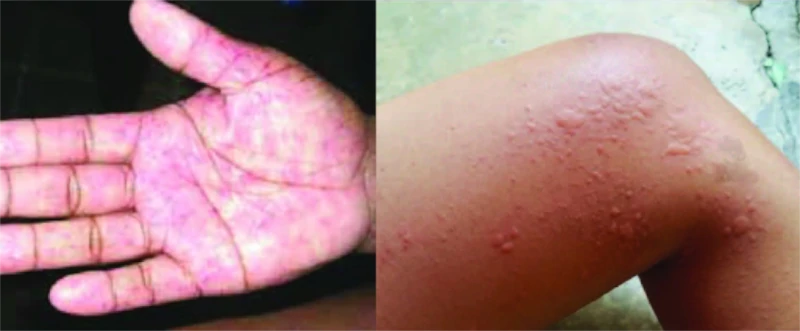
Drug Reaction
Drug reactions are unwanted reactions of the body that occur following the drug administration. They vary in frequency and severity. Incidence of drug reaction increases with age. About 6 to 30% patients experience drug reactions.
Causes for Drug reactions
- Drug overdose.
- Accumulation of certain metabolites following prolonged exposure to drugs.
- Interaction between different drugs that are taken at same time.
- Changes in the metabolic or nutritional status due to certain drugs.
- Damage to the chromosomes following certain drug administration.
- Idiopathic or unpredictable or unknown causes.
Common drugs that cause drug reactions
- Drug overdose.
- Amoxycillin
- Ampicillin
- Antimalarials
- Antituberculous drugs
- Cephalosporins
- Penicillamine
- Penicillin
- Phenytoin
- Allopurinol
- Anticonvulsants
- NSAIDs
- Diuretics
Clinical presentations of drugs reactions
Anaphylaxis - Starts suddenly and progress rapidly with severe itching and redness and leads to angioedema.
Urticaria and angioedema - Itching, redness, swelling of lips and respiratory tract causing difficulty in breathing and death.
Drug induced hypersensitivity syndrome - Fever, skin eruptions and involvement of internal organs like kidney or lungs or brain etc.
Acute generalized exanthematous pustulosis - Fever with several tiny pus filled lesions on the face, which spreads rapidly to limbs.
Severe cutaneous drug reactions - Includes
- Erythema multiforme - Red patches with central fluid filled lesions (Target lesions) seen over the limbs.
- Stevens–Johnson syndrome - Several blisters and erosions of skin involving less than 10% body surface area
- Toxic epidermal necrolysis - More severe condition with blisters and erosions of the skin involving more than 30% body surface area.
Serum sickness - Reaction starts between 5 to 12 days after drug intake - Fever, joint pain, urticaria, swelling of hands and feet.
Fixed drug eruption - Lesions are reddish - violaceous , round - oval shaped associated with severe itching or burning sensation. Characteristically they recur at the same site following re administration of the same offending drug .
Others - There are numerous other patterns with which a drug reaction can present and will be diagnosed by the doctor based on history and morphology of lesions.
Management of Drug reactions
The condition can range from being asymptomatic and self limiting to life threatening and deadly . So it is always suggested to visit the Dermatologist at the earliest whenever some abnormal skin reactions appear following consumption of a drug. The Doctor diagnoses the condition with proper history and thorough examination of lesions. Blood tests, histopathological examination are done to confirm the diagnosis. The current episode will be managed depending on the severity and symptoms of the drug reaction. Drug provocative test, intra dermal tests are done to identify the offending drug. Thus patient will avoid the drug and prevent the recurrences in future.
Doctors at 4 Senses Clinic take history patiently, examine the patient thoroughly and diagnose the condition with minimal and necessary investigations. After finding out the root cause of problem, they provide accurate treatment. The doctors also counsel on how to prevent further recurrences. If you are looking at treatment for drug reaction, contact Call:6366494494
